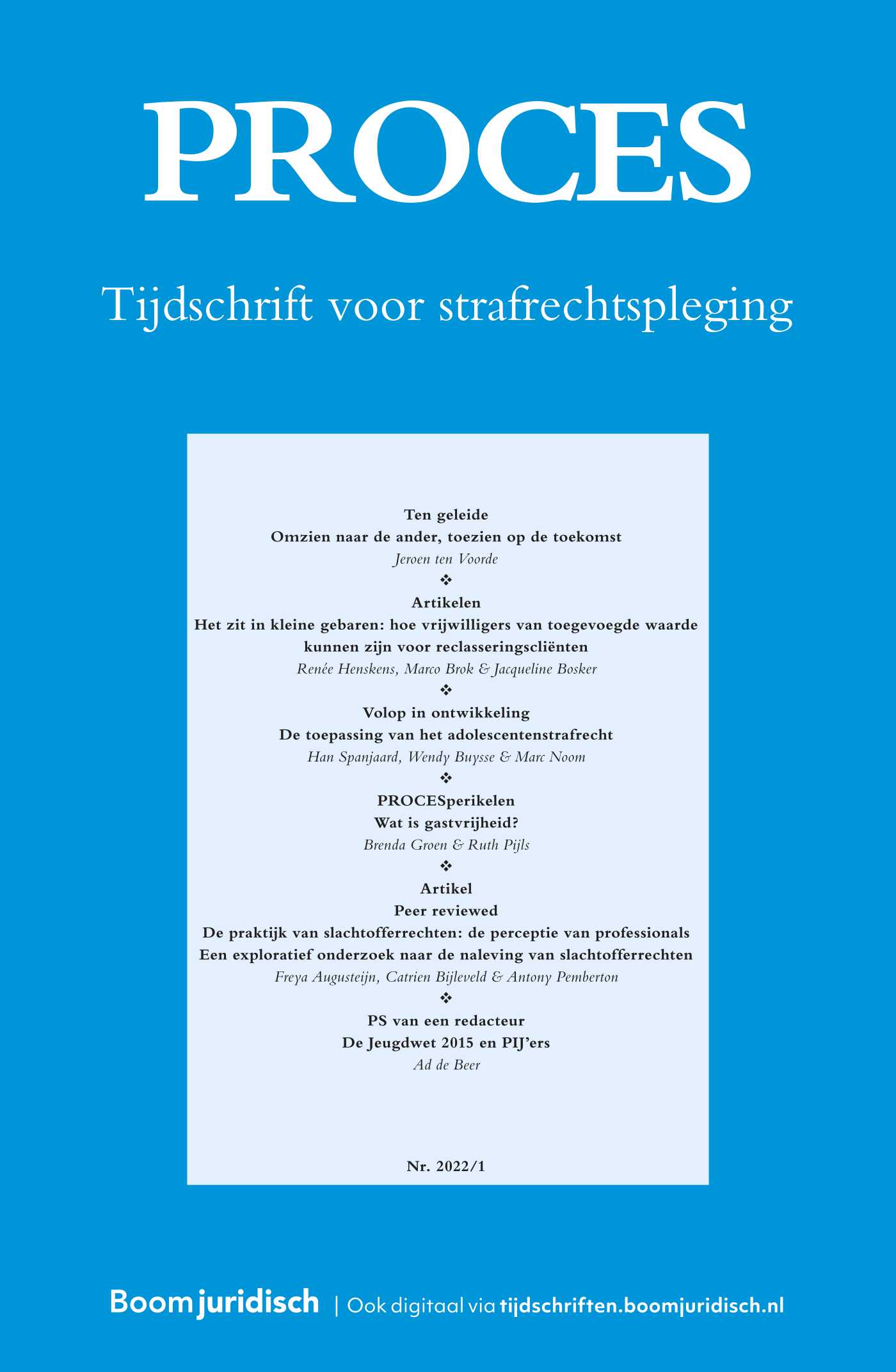|
In 2017, the Research and Documentation Centre of the Ministry of Justice & Security (WODC) published the report ‘Neuroscientific application in the juvenile criminal justice system’. This report concerns an inventory of possible neuroscientific applications in the juvenile criminal justice system. The release of the report attracted attention from well-recognized national media. The positive media attention was striking for several reasons. It indicated that –in contrast to a few decades ago – it has become more accepted to study neurobiological correlates of antisocial behavior. On the other hand, the overwhelming news value indicated that the idea that antisocial behavior is also associated with neurobiological deficts has not become common knowledge yet. Based on the WODC report, in the current article the authors summarize how neuroscientific knowledge and methods could be applied in the juvenile criminal justice system. |


PROCES
Meer op het gebied van Criminologie en veiligheid
Over dit tijdschriftMeld u zich hier aan voor de attendering op dit tijdschrift zodat u direct een mail ontvangt als er een nieuw digitaal nummer is verschenen en u de artikelen online kunt lezen.
| Redactioneel |
Creatief met straffen |
| Auteurs | Mr. dr. Sigrid van Wingerden |
| Auteursinformatie |
| Artikel |
|
| Trefwoorden | Neurowetenschappen, jeugdstrafrechtketen, interventie, meetmethoden |
| Auteurs | Liza Cornet MSc en Dr. Katy de Kogel |
| SamenvattingAuteursinformatie |
| Artikel |
Datingfraude: van romantische droom naar financiële nachtmerrieEen onderzoek naar hulpverlening voor slachtoffers van datingfraude |
| Trefwoorden | Slachtofferschap, Datingfraude, Hulpverlening, Slachtofferhulp |
| Auteurs | Dr. mr. Miriam Wijkman en Isabel Kooij MSc |
| SamenvattingAuteursinformatie |
|
Datingfraud is nothing new but it is an underexposed subject. Victims are approached on online datingsites by criminals whose goal is to gain large amounts of money. To achieve this, they start, with a false identity, an online relationship with their victims. In this article research has been done what the needs of the victims are after the offense has been committed. To this end interviews have been made with victims of datingfraud and staff members of victim support. Many victims do not end up with victim support because the police refuse to make a report. Nevertheless, the emotional and legal aid seems to functioning well. However, the practical help leaves much to be desired, especially because employees are not informed about all possibilities there are to support the victims. |
| Praktijk |
Van een nieuwe lente en nieuwe digitale verbindingen |
| Auteurs | Dr. Ben Kokkeler |
| Auteursinformatie |
| Artikel |
De afdoening van ernstige strafbare feiten waar dementerende justitiabelen bij betrokken zijn |
| Trefwoorden | Dementie, ernstige strafbare feiten, Afdoening, gedwongen zorg |
| Auteurs | Ing. Marijke te Hennepe-van Vulpen MSc LLB |
| SamenvattingAuteursinformatie |
|
Persons who suffer from dementia could potentially commit serious crimes. By studying 22 casus of settlements in cases of serious crimes allegedly committed by a demented person, published on ‘rechtspraak.nl’, the mode of settlement in these cases was established and problems in that field were identified. The group of dementia sufferers proved to be heterogeneous which resulted in a great variety of settlements within the criminal proceedings. However, problems do occur and certain aspects of these problems are not resolvable within the current Dutch penal systems. Reflection on this issue is desirable, as the number of people who suffer from dementia will increase considerably in the near future. |
| Artikel |
Aandacht voor vaderschap in de gevangenisEvaluatie van de Exodus-workshop Vrij Verantwoord Vaderschap |
| Trefwoorden | Vaderschap, Detentie, Interventie, Evaluatie |
| Auteurs | Dr. Joni Reef, Naomi Ormskerk MSc en Lisa van Es MSc |
| SamenvattingAuteursinformatie |
|
Around 36.000 men enter Dutch prisons every year. Nearly half of them are father. Imprisonment is destructive to father involvement. Many prisoners involuntary fail to stay connected with their family and are unable to reconnect with family after release. However, father involvement protects fragile families, children and fathers themselves from collateral consequences of imprisonment and even reduces recidivism. One of the first Dutch initiatives for fathers in prison came from voluntary organization Exodus. Since 2014, they run an 8-week workshop on fatherhood in a number of Dutch penal institutions. Fathers work on the restoration or reconstruction of their relationship with their children and parenting partners. In this article, we review participating fathers’ perceptions of the workshop and the changes in their attitude towards fatherhood. |
| Column |
|
| Auteurs | Prof. dr. Joke Harte |
| Auteursinformatie |

